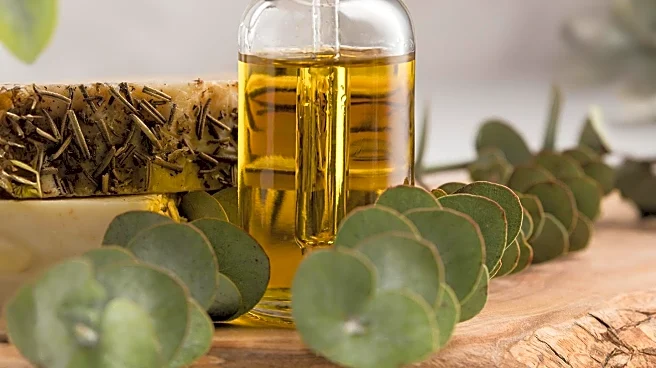What's Happening?
Recent research has highlighted the potential of Houttuynia cordata essential oil (HCEO) in cosmetic applications, particularly for treating hyperpigmentation. The study, conducted using in vitro methods,
focused on the oil's ability to inhibit melanogenesis, the process responsible for melanin production in the skin. Excessive melanin can lead to hyperpigmentation and related skin disorders. The research utilized a mushroom tyrosinase inhibition assay to evaluate the anti-melanogenic potential of HCEO. Tyrosinase is a key enzyme in melanin biosynthesis, and its inhibition is a crucial strategy for managing hyperpigmentation. The study also assessed the antimicrobial and antioxidant properties of HCEO, which could further enhance its utility in skincare formulations.
Why It's Important?
The findings are significant for the cosmetic industry, which continuously seeks effective and natural ingredients for skincare products. Hyperpigmentation is a common concern, and the ability of HCEO to inhibit tyrosinase activity offers a promising natural alternative to synthetic compounds. Additionally, the antimicrobial properties of HCEO against skin-related bacteria and fungi could make it a valuable ingredient in formulations aimed at acne treatment. The antioxidant activity of the oil further supports its potential in protecting skin cells from oxidative stress, a factor in aging and skin damage. These combined properties suggest that HCEO could be a multifunctional ingredient in cosmetic products, appealing to consumers seeking natural and effective skincare solutions.
What's Next?
Further research and development are likely to focus on optimizing the formulation of HCEO in cosmetic products. This includes ensuring the stability and efficacy of the oil in various product types, such as creams and gels. Regulatory approval and consumer safety testing will be essential steps before HCEO can be widely marketed in skincare products. The cosmetic industry may also explore the potential of HCEO in other applications, such as anti-aging and anti-inflammatory products, given its broad range of bioactivities.
Beyond the Headlines
The use of natural plant extracts in cosmetics aligns with the growing consumer demand for sustainable and eco-friendly products. Houttuynia cordata, being a widely available plant in Southeast Asia, offers a renewable source for essential oil production. This could lead to economic opportunities in regions where the plant is cultivated, promoting local agriculture and sustainable practices. Additionally, the study's findings may encourage further exploration of other traditional plants for their potential in modern skincare solutions.










